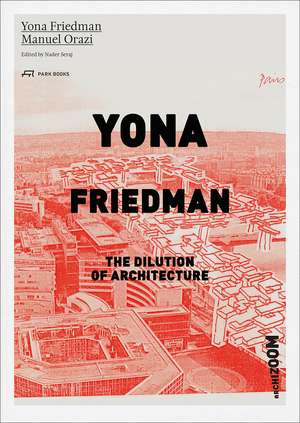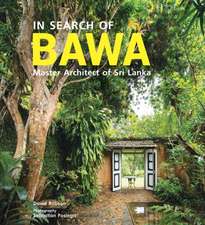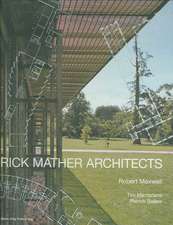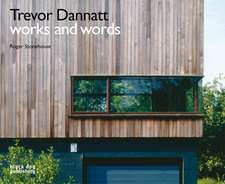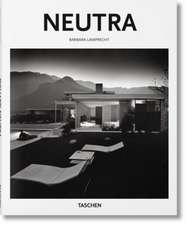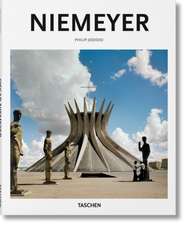Yona Friedman. The Dilution of Architecture
Editat de Nader Seraj, Cyril Veillon Autor Yona Friedman, Manuel Orazien Limba Engleză Paperback – 15 noi 2015
Hungarian-born French architect Yona Friedman is one of the most fascinating architectural theorists of our time. Gaining early recognition for his Manifesto de l’Architecture Mobile, he is best-known for his sketches of the Ville Spatiale, or Spatial City, which applied the core concepts of the manifesto to create mutable “superstructures” over existing cities. The Spatial City represents an important thread running throughout Friedman’s work: He has always sought to provide people with the structures within which to construct and reconstruct their own environment, be it within the slums of the Third World or modern Western cities.
Yona Friedman. The Dilution of Architecture explores Friedman’s process, taking readers through the movements and projects with which he has been involved, from Archigram, an avant-garde architectural group formed in the 1960s; to the construction of ephemeral, emergency architecture in disaster zones; architectural utopianism; and the rise and fall of the megastructure. The book also considers the pedagogical aspect of Friedman’s work, which extended his influence well beyond architecture to planning, information science, sociology, visual art, and filmmaking. Drawing on a recent exhibition at the Archizoom gallery at the Swiss Federal Institute of Technology in Lausanne, the book supplements the essays with a vast collection of sketches, drawings, and documents related to Friedman’s work and concludes with a conversation between Friedman and the Swiss architect and writer Bernard Tschumi.
Friedman’s contributions continue to inspire, and this book offers the first comprehensive overview of his impressive body of work.
Yona Friedman. The Dilution of Architecture explores Friedman’s process, taking readers through the movements and projects with which he has been involved, from Archigram, an avant-garde architectural group formed in the 1960s; to the construction of ephemeral, emergency architecture in disaster zones; architectural utopianism; and the rise and fall of the megastructure. The book also considers the pedagogical aspect of Friedman’s work, which extended his influence well beyond architecture to planning, information science, sociology, visual art, and filmmaking. Drawing on a recent exhibition at the Archizoom gallery at the Swiss Federal Institute of Technology in Lausanne, the book supplements the essays with a vast collection of sketches, drawings, and documents related to Friedman’s work and concludes with a conversation between Friedman and the Swiss architect and writer Bernard Tschumi.
Friedman’s contributions continue to inspire, and this book offers the first comprehensive overview of his impressive body of work.
Preț: 270.03 lei
Nou
Puncte Express: 405
Preț estimativ în valută:
51.67€ • 53.84$ • 42.78£
51.67€ • 53.84$ • 42.78£
Carte disponibilă
Livrare economică 13-27 martie
Livrare express 27 februarie-05 martie pentru 87.58 lei
Preluare comenzi: 021 569.72.76
Specificații
ISBN-13: 9783906027685
ISBN-10: 3906027686
Pagini: 592
Ilustrații: 365 color plates, 340 halftones
Dimensiuni: 178 x 254 x 43 mm
Greutate: 1.65 kg
Editura: Park Books
Colecția Park Books
ISBN-10: 3906027686
Pagini: 592
Ilustrații: 365 color plates, 340 halftones
Dimensiuni: 178 x 254 x 43 mm
Greutate: 1.65 kg
Editura: Park Books
Colecția Park Books
Notă biografică
Born in 1923, Yona Friedman is an architect, theoretician, and artist based in Paris. Manuel Orazi is an architectural historian and an editor of architectural books for the publishing house Quodlibet.
Cuprins
A Sort of Foreword, Yona Friedman
PART I: The Dilution of Architecture/ Yona Friedman
Architecture as Improvisation
Strip cartoon: Improvisation in architecture
“Space-time” architecture
Strip cartoon: The dilution of architecture
Anthology of a Process
1. Massive
Mainstream architecture, “Shoe-box”
2. “Ville Spatiale”
Early Studies
Scheme of the theory, 1958-65
Level floors studies, 1958-62
Space-Chain technique, 1958-70
Irregular pattern, 1959-90
The inner city, 1958-2000
European Projects
Paris Spatial, various projects, 1959-2008
Venice of Monaco, 1959
Moscow, 1990
Milan stadium, 2004
Berlin, 2004
Vienna, 2004
Asian Projects
Tokyo International Forum, 1989
Yokohama Triennale, 2001
American Projects
Tokyo International Forum, 1989
Yokohama Triennale, 2001
American Projects
New York, various projects, 1958-99
Los Angeles freeway, 1964
San Francisco, 2006
African Projects
Early studies, 1958-59
Treichville, 1959
Tunis, competition, 1959
Dar es Salaam, Parliament House, 1967
Bridge-Town
Gibraltar, 1962
African Bridge-Town, 1963
Eleven Bridge-Towns to link five continents, 1963
Channel Bridge, 1963
Venice, 1969-2005
Strasbourg, Administrative Center for the EU, 1990
Peace Bridge, Tel Aviv, 1990
Centre-Bridge for London, 2004
3. Accumulation
Containers
Trihedrical containers: A versatile technique, c.2005
Container agglomeration, Semi-containers, 2002-05
Container Street-Museum, c. 2005
Space-frame container, c.2005
Strip cartoon: Container accumulation
4. Transparency
Irregular Structures
Introduction and manuals, from 1994
Panel chains, 1945
Movable boxes, 1949
Cylinders, 1953-58
Trihedral system, 1955
Curved panels, 1956
Carboard boxes, 1990-2005
Lamellar structures, from 1990
Crumpled sheets, 1992-2000
Macaroni, 1992
The Train, from 1992
Gribouilli, 1995-2005
Moebian structure, from 2000
Irregular & Pseudeo tensegrity, 2000-05
Merzstrukturen, 2006
Iconostase
Proteinic structures, 1992
Space-chain dome, 1970-85
Spae-chain iconostase, various projects, 2010-13
5. Dissipated
Meuble + Plus, 2009
6. “Nature Made Habitable”
Street museum Como, 2004-08
Graffiti museum, 2006-09
Museum of Afghan civilization, from 2008
Amorphous architecture, 2009
Tree museum, Rome-Paris, c. 2012
Shop Windows: A museum of our civilization, 2012
Strip cartoon: A museum is not a building
7. The Labyrinth
Nagasaki competition, 1996
8. Build Less
Strip cartoon: Architecture without building
Part II: The Erratic Universe of Yona Friedman/ Manuel Orazi
Prologue
1. The Early Years
Hungarian “false fascism”
Science as art: Werner Heisenberg
Mythology as collective psychology: károly Kerényi
Architecture in Hungary between the wars
Palestine/Israel: Utopian Zionism
Haifa “the Red” and the Technion Institute of Technology
Konrad Wachsmann’s technological otopia
Europa ‘56
2. Theories. Society and Technology
“L’architecture mobile” and its circulation
“Groupe d’études d’Architecture mobile” GEAM
Constant, Debord, Lefebvre
1964: The Year of the megastructure
Michel Ragon’s GIAP
Ideology of the Street
Graph theory and the Diagram
Architecture-by-yourself: Nicholas Negroponte and the MIT
3. Architecture and Autoregulation
“Utopies réalisable”
Lycée David, Angers
Philosophy of participation
Part III: Appendix
A conversation with Yona Friedman, Manuel Orazi, 2005
Seven questions for Bernard Tschumi, Guia Gamerino and Manuel Orazi, 2005
Exhibition
Yona Friedman—Genesis of a Vision, Nader Seraj, 2012
Lecture series: Manuel Orazi, Juan Miguel Hernández Léon, Dominique Rouillard, 2012
Bibiliography
Books and articles by Yona Friedman
Books and articles on Yona Friedman
PART I: The Dilution of Architecture/ Yona Friedman
Architecture as Improvisation
Strip cartoon: Improvisation in architecture
“Space-time” architecture
Strip cartoon: The dilution of architecture
Anthology of a Process
1. Massive
Mainstream architecture, “Shoe-box”
2. “Ville Spatiale”
Early Studies
Scheme of the theory, 1958-65
Level floors studies, 1958-62
Space-Chain technique, 1958-70
Irregular pattern, 1959-90
The inner city, 1958-2000
European Projects
Paris Spatial, various projects, 1959-2008
Venice of Monaco, 1959
Moscow, 1990
Milan stadium, 2004
Berlin, 2004
Vienna, 2004
Asian Projects
Tokyo International Forum, 1989
Yokohama Triennale, 2001
American Projects
Tokyo International Forum, 1989
Yokohama Triennale, 2001
American Projects
New York, various projects, 1958-99
Los Angeles freeway, 1964
San Francisco, 2006
African Projects
Early studies, 1958-59
Treichville, 1959
Tunis, competition, 1959
Dar es Salaam, Parliament House, 1967
Bridge-Town
Gibraltar, 1962
African Bridge-Town, 1963
Eleven Bridge-Towns to link five continents, 1963
Channel Bridge, 1963
Venice, 1969-2005
Strasbourg, Administrative Center for the EU, 1990
Peace Bridge, Tel Aviv, 1990
Centre-Bridge for London, 2004
3. Accumulation
Containers
Trihedrical containers: A versatile technique, c.2005
Container agglomeration, Semi-containers, 2002-05
Container Street-Museum, c. 2005
Space-frame container, c.2005
Strip cartoon: Container accumulation
4. Transparency
Irregular Structures
Introduction and manuals, from 1994
Panel chains, 1945
Movable boxes, 1949
Cylinders, 1953-58
Trihedral system, 1955
Curved panels, 1956
Carboard boxes, 1990-2005
Lamellar structures, from 1990
Crumpled sheets, 1992-2000
Macaroni, 1992
The Train, from 1992
Gribouilli, 1995-2005
Moebian structure, from 2000
Irregular & Pseudeo tensegrity, 2000-05
Merzstrukturen, 2006
Iconostase
Proteinic structures, 1992
Space-chain dome, 1970-85
Spae-chain iconostase, various projects, 2010-13
5. Dissipated
Meuble + Plus, 2009
6. “Nature Made Habitable”
Street museum Como, 2004-08
Graffiti museum, 2006-09
Museum of Afghan civilization, from 2008
Amorphous architecture, 2009
Tree museum, Rome-Paris, c. 2012
Shop Windows: A museum of our civilization, 2012
Strip cartoon: A museum is not a building
7. The Labyrinth
Nagasaki competition, 1996
8. Build Less
Strip cartoon: Architecture without building
Part II: The Erratic Universe of Yona Friedman/ Manuel Orazi
Prologue
1. The Early Years
Hungarian “false fascism”
Science as art: Werner Heisenberg
Mythology as collective psychology: károly Kerényi
Architecture in Hungary between the wars
Palestine/Israel: Utopian Zionism
Haifa “the Red” and the Technion Institute of Technology
Konrad Wachsmann’s technological otopia
Europa ‘56
2. Theories. Society and Technology
“L’architecture mobile” and its circulation
“Groupe d’études d’Architecture mobile” GEAM
Constant, Debord, Lefebvre
1964: The Year of the megastructure
Michel Ragon’s GIAP
Ideology of the Street
Graph theory and the Diagram
Architecture-by-yourself: Nicholas Negroponte and the MIT
3. Architecture and Autoregulation
“Utopies réalisable”
Lycée David, Angers
Philosophy of participation
Part III: Appendix
A conversation with Yona Friedman, Manuel Orazi, 2005
Seven questions for Bernard Tschumi, Guia Gamerino and Manuel Orazi, 2005
Exhibition
Yona Friedman—Genesis of a Vision, Nader Seraj, 2012
Lecture series: Manuel Orazi, Juan Miguel Hernández Léon, Dominique Rouillard, 2012
Bibiliography
Books and articles by Yona Friedman
Books and articles on Yona Friedman
